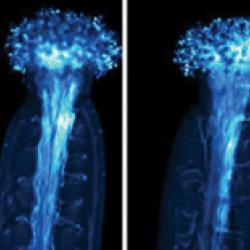The Plant Biology specialization provides rigorous training in broad areas of plant biology. Faculty in this specialization use state-of-the-art approaches in genetics of model organisms, cell biology, proteomics, bioinformatics and functional genomics to study development, phytohormone signaling, metabolomics, gene regulation, epigenetics, viral and microbial pathogen-plant interactions, plant defense, biofuels and the evolutionary origins of higher plants. As highlighted in the 2009 report on "A New Biology for the 21st Century" by the U.S. National Research Council (NRC), greater investment in plant biology research and training is critical and urgently needed to address major societal challenges in food security, renewable energy, protecting the environment, and human health. The Plant Biology specialization is focused on meeting these needs through research, education and graduate student training.
This specialization area is interdepartmental and interdisciplinary, including not only the core faculty members in the Department of Cell Biology and Molecular Genetics but also faculty in the Department of Plant Science and Landscape Architecture, Department of Biology, Center for Bioinformatics and Computational Biology, Department of Chemical and Biomolecular Engineering, and the Institute for Bioscience and Biotechnology Research.
Our faculty members actively collaborate with researchers located in the Washington, D.C. area including at the U.S. Department of Agriculture (USDA), Smithsonian Institute, National Institutes of Health (NIH), J. Craig Venter Institute, National Arboretum, Food & Drug Administration (FDA), and National Aeronautics & Space Administration (NASA). Our multidisciplinary and highly collaborative environment facilitates research advances and broadens educational and career opportunities for our students.
Graduate Program
- The requirements for Ph.D. students in the Plant Biology specialization are intended to ensure that students receive broad and interdisciplinary training in plant biology, cell biology, genomics and bioinformatics.
- Students are expected to develop the technical expertise and the critical thinking skills necessary for a rewarding career as an independent scientist.
- All Ph.D. students in Plant Biology follow the first-year program of BISI-MOCB including the core courses, laboratory rotations and seminars for all entering BISI-MOCB graduate students.
- An advisory committee, in consultation with the research advisor, then helps each student choose the advanced courses that are appropriate for his/her research plans and career objectives.
- In addition to formal courses, the program provides opportunities for critical discussion of the scientific literature through seminar courses and journal clubs.
- Students have ample opportunities to present their research and receive feedback from peers and faculty members at the weekly departmental Research In Progress(RIP) seminar series and monthly group meetings of Genetics with Eukaryotic Model Systems (GEMS) and the Arabidopsis thaliana Research Initiative at UM (ATRIUM).
- Students also participate in and present their research at annual regional meetings, such as the “Plant Biology Mini-Symposium," the Mid-Atlantic Section of the American Society of Plant Biologists meetings and the Annual Mid-Atlantic Plant Molecular Biology Society Meeting, which bring together scientists from academia, industry and government agencies in the mid-Atlantic region and beyond.
- Our Ph.D. graduates (and postdocs) go on to postdoctoral, faculty and independent scientist positions at prominent universities, biotechnology companies and federal government agencies.
Graduate Courses in Plant Biology and Related Fields
- Cell Biology I, Structure and Function (Song, Cao, Jose)
- Nucleic Acid Research (Khan)
- Genetics I, Gene Expression (Dinman)
- Genetics II (Mount)
- Plant Development and Physiology I (Sze)
- Plant Development and Physiology II (Liu)
- Plant Biology Journal Club (Chang, Sze, Liu)
- Principles of Microscopy (Wolniak)
- Programming for Biology (Mount and El-Sayed)
- Bioinformatics and Genomics (El-Sayed and Cummings)
- Bioethics (Simon or Pick)
- CBMG and MOCB Seminar Colloquium











